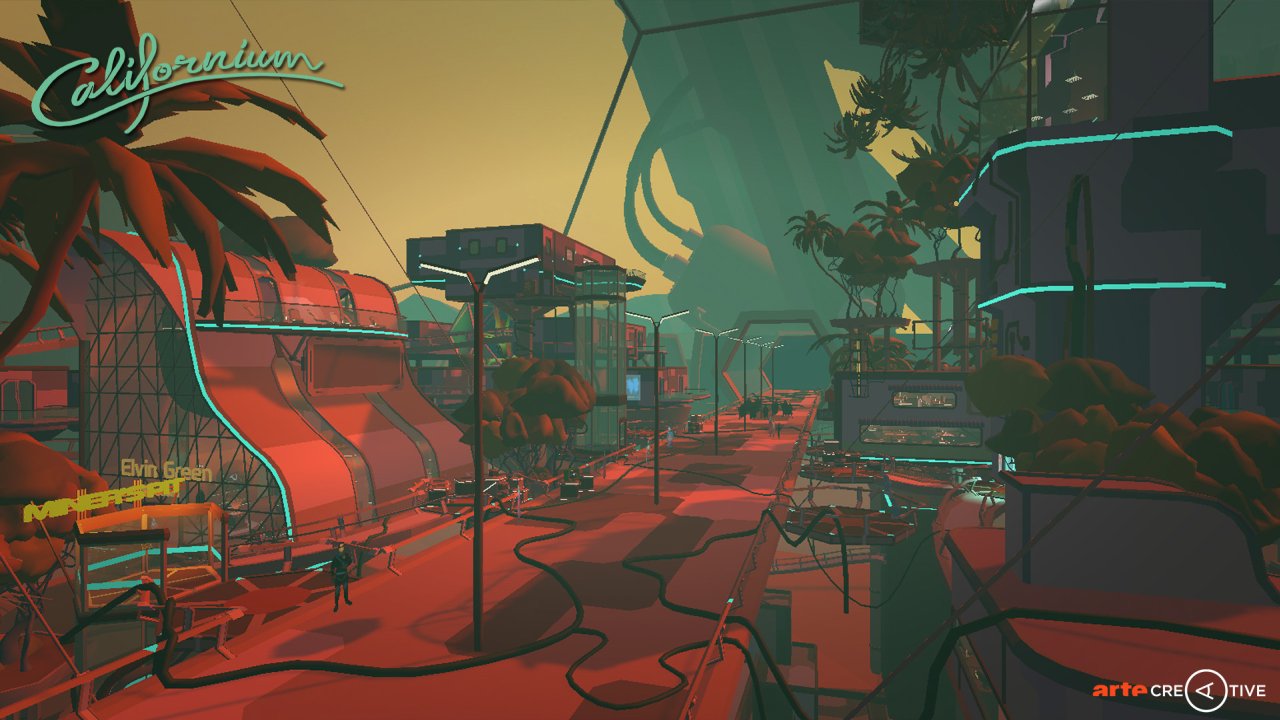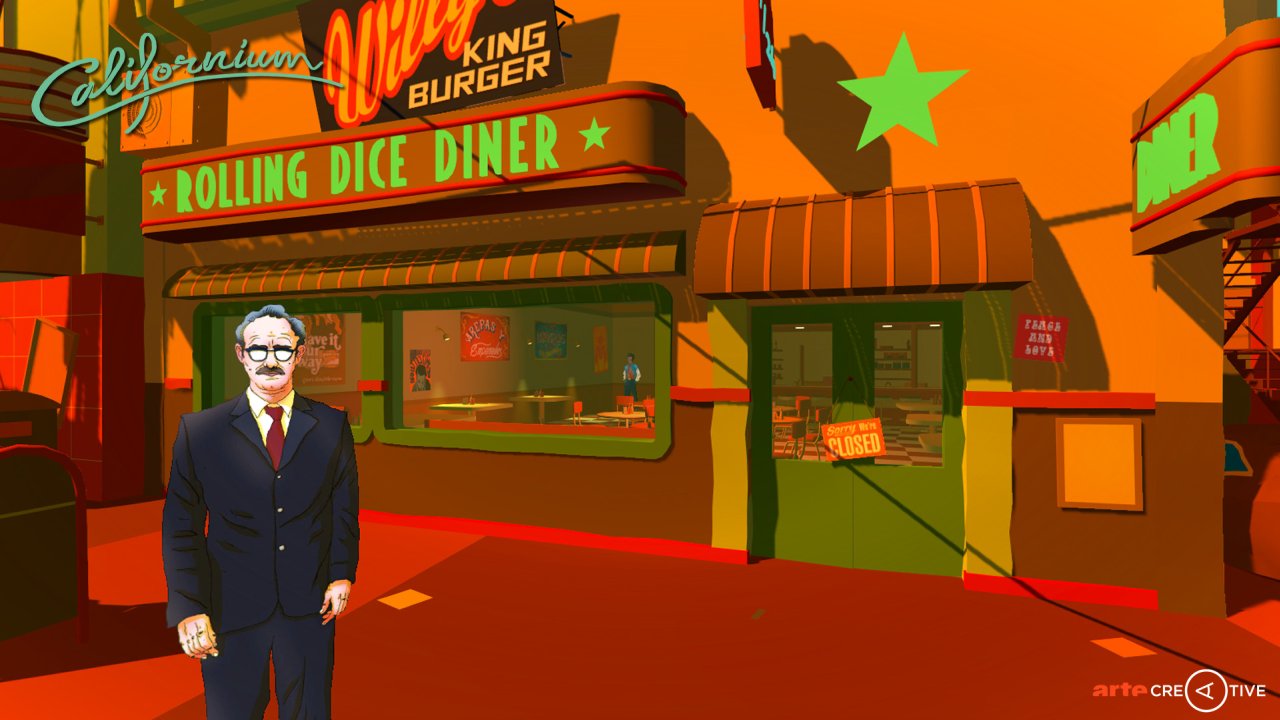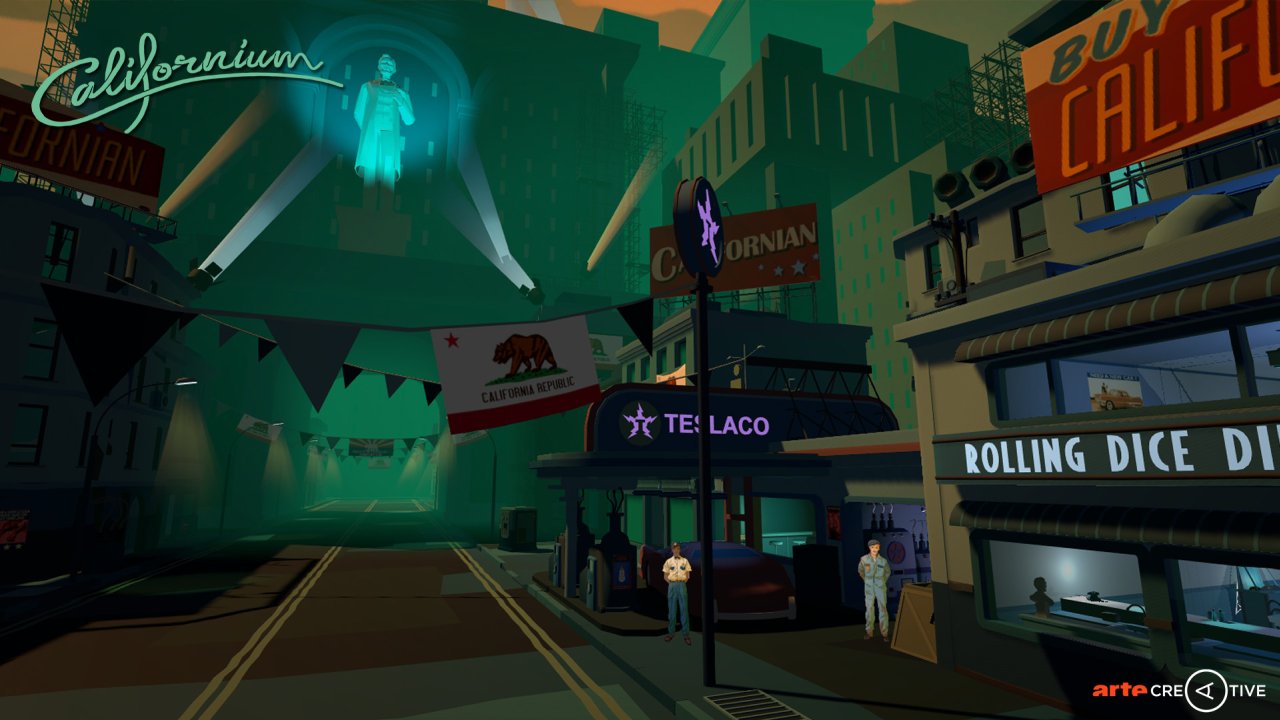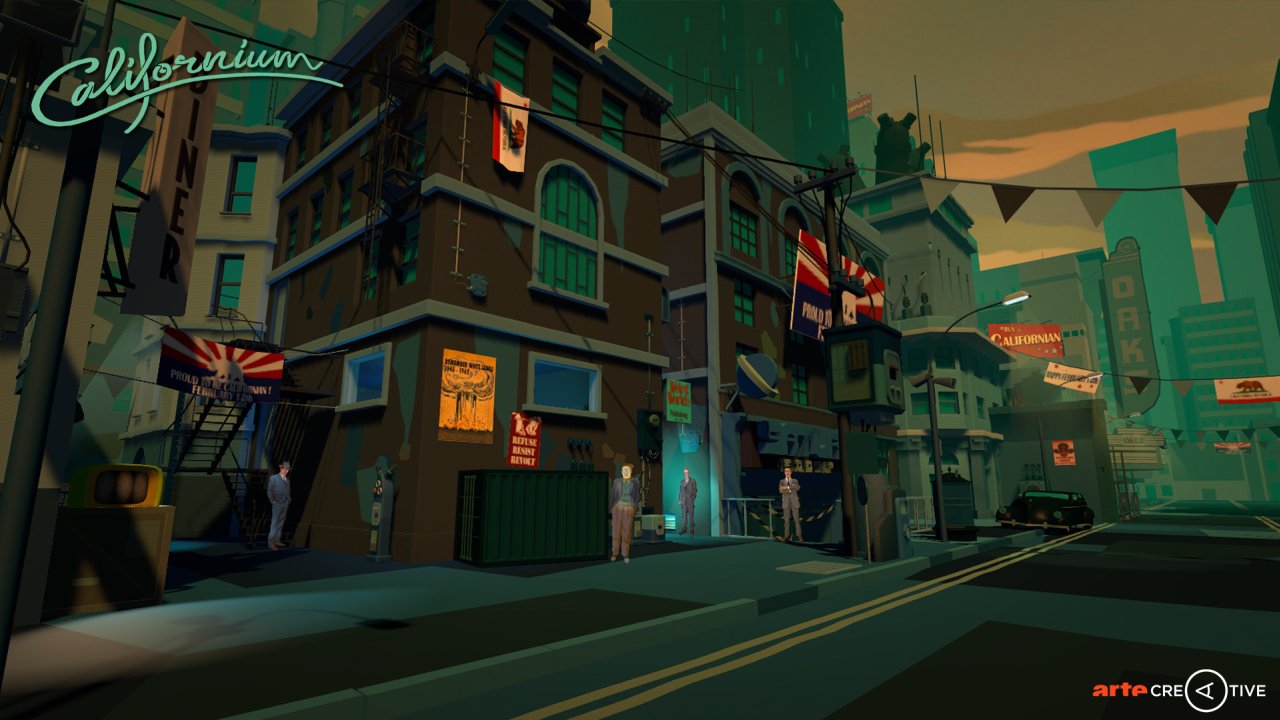Californium Review
Less Blade Runner, more Blade Stroller
When it comes to the business of parallel worlds, you’d think that video games would’ve exhausted every possible avenue of exploration by now. Maybe in the early nineties, when the likes of Link to the Past and Dark Seed still smelled of vacuum packaging rather than twenty years of accumulated dust, telling people that your game had a light world and a dark world might’ve been a bold and exciting statement, but nowadays it’s like advertising your newly-opened pizza takeaway with the ham-and-cheese special front and centre. They’ve been done to death in every genre imaginable, and once you get over the novelty of the world map being the same shape, they start to lose some of their charm. Consequentially, when Californium, a first-person exploration game about jumping between parallel universes—heavy influenced by the works of Philip K. Dick—turns up out of nowhere and demands to be taken seriously, one can’t help but wonder how it’s going to keep things fresh. Obviously as one of the giants of science fiction, more so one who often used parallel universes or clones in his work, Philip K. Dick has already massively influenced video games in ways we can’t even begin to describe, but how can you directly inject his raw style and themes into a medium that’s already been saturated with derivative works upon derivative works without treading old ground? Quite easily, as it happens. That’s literature for you.

And when I say Californium is ‘heavily influenced’ by Philip K. Dick, try to imagine that in the same way that Alan Wake is ‘heavily influenced’ by Stephen King or the same way that Snatcher is ‘heavily influenced’ by Blade Runner: that is to say, totally enamoured. If it was a person, it would be a screaming teenage fangirl, jumping up and down at the front of a barely-contained airport crowd as Philip disembarks from a flight. In-jokes and references to his work litter the world, and even the basic premise sounds more than a wee bit familiar. You are Elvin Green, a good-for-nothing writer just barely keeping your head above the poverty line in a grimy corner of 1960s California, and your everyday world is collapsing around your ears: your wife has left, your daughter is dead, your flat is a decrepit shrine to laziness piled high with cairns of empty bottles, and the creative intellect inside your head that once earned you money has been razed to the ground by a combination of grief, drugs, and the kind of cheap corner-store gin that tends to stick the bottle to the table.
But all is not lost. A voice begins to speak to you through the television; an alien creature, a divine power, or perhaps just a vivid hallucination brought on by last night's bathroom cupboard smorgasbord. Whatever the case, for once it's not telling you to put on a rubber mask and kill Russian mobsters; this voice is content with giving you the power to peel back the layers of reality and then contentedly observe, like an irresponsible parent letting their child run loose with a fully-charged weed-whacker. Through this unusual helping hand, Elvin is given a chance to escape the miserable dead-end that is his life, but may soon discover that his current situation is nothing more than a very small frying pan in the middle of a very large, hostile, all-consuming fire.
Let’s lay the cards on the table right now, shall we? Californium is not a game especially overburdened with mechanics. You walk around, let characters talk to you, take in the low-poly sights, and when you feel like it, tear enough holes in the space-time continuum to move on to another parallel universe. I actually really like how Californium handles that particular power; it’s wilfully obtuse and opaque, and it works entirely in the game’s favour. You’re supposed to find and click on a series of glowing emblems embedded in your surroundings—the budget presumably didn’t allow for fancy particles and eerie distortion effects—but the exact rules governing when and how they reveal themselves are deliberately kept in the dark. Some are simply hidden away in cheeky places, like extradimensional Easter eggs, but many are only revealed when standing in a certain position, or looking in a certain direction. Many more are marked by strange anomalies in the world—things vanishing on the spot, shifting on their own or reacting to your approach—while others simply come and go whenever they feel like it. It gives a distinct sense of toying with a power from a higher plane; one governed by alien laws that appear totally arbitrary but are merely well beyond Elvin’s—or our—understanding. It helps that there’s something fundamentally surreal about watching a salt-shaker blink in and out of existence like a celestial filament somewhere is about to melt.

But nevertheless, a scavenger hunt is a scavenger hunt; that is to say, the video game equivalent of painstakingly picking lice out of the coat of an overgrown Old English Sheepdog. You can do whatever you like to make it more interesting, but at some point you’ll still find yourself combing back and forth through the same familiar area looking for the one emblem that has somehow consistently evaded your attention, and that’s when tedium settles in like a big, warm, sopping wet duvet. This isn’t like a scavenger hunt in any other game, where at least you could conceivably go off and do something else when your roadblock seems impassable; this, and talking to the bleak scattering of other characters, are the only activities available to you. Thankfully the game is kind enough to keep track of how many emblems remain in a given area, so you can at least narrow down your searches a little bit, but all it takes is one tricky hiding place to derail the entire experience into a muddy bog. Californium’s pace is already so leisurely that coming to a complete halt is no big shock—one wonders why they were generous enough to even bother putting in a run button—but at some point I’d very much like to move on, and I can’t do that if I’m checking behind all the sofas for my unseen benefactor’s interstellar car keys. Why do I even have to achieve one-hundred percent completion? Surely the fabric of time and space can offer me a little bit of leeway in that department.
Still, if nothing else it encourages you to have a good, hard look around and appreciate the amount of work that went into the environments. Though sorely lacking in the kind of minute irrelevant detail and pointless interactivity I crave from my exploration-driven walk-em-ups—you can’t even play with the light switches, for crying out loud—Californium’s worlds have nevertheless been crafted with care, imagination, and colour palettes so strong you could lay them on the ground and call it a foundation. 1960s California is a world of warm, earthy colours, bathed in the orange glow of an eternal sunset. It feels hot and sleepy; a timeless recess away from the fast-developing world. There are some neat little touches in the environments you could easily miss entirely—I mean, if you weren’t obliged to trawl back and forth several times, running your eyes over every single surface, which is sadly the case—and like every game with parallel worlds, seeing how each universe reinterprets and twists the landscape of your quiet home street is a reward in itself.

At the very least, Californium absolutely nails the tone and atmosphere of a game looking longingly at the spectre of a sci-fi author known for creating fragile realities. An air of subtle surrealism hangs over the entire experience. Not surrealism as we usually know it in video games, wherein level designers break out their fun tools and compete to see who can toy with the player the most thoroughly, but the kind of creeping surrealism that hangs in the wings, dropping in just often enough to make you question the authenticity of the world before you before disappearing again. If Elvin Green has a valid place in every universe, who is to say which ones are falsehoods and which one is the objective reality? If he is truly tearing holes in space-time, why can nobody else see them? Is the voice in his head actually exerting any influence on the world around him, or is Elvin just going around staring at blank television screens and making everybody very uncomfortable? The game even goes so far as to play with its own rules to achieve this goal. Characters are rendered as static cardboard cutouts, no more complicated than Doom ammo crates, but look away for a moment and there’s a chance they’ve all changed places. Limitations of the medium, or a behaviour of the dreamlike world Elvin has found himself in? What things are presented as-is, and what things are we supposed to interpret as just part of the medium? True, many of these are hardly novel ideas, but rarely have they been presented this well in a video game, or made to coexist while still staying this cohesive.
Speaking of old ideas wearing out their welcome, could somebody please persuade Elvin Green to open his damn mouth? Most games with silent protagonists will at least make some attempt to draw attention away from their awkward disability by having other characters emote on their behalf, or steering them away from that responsibility, or putting them in situations where they have no reason to open their mouth anyway; Californium is full of people who talk to Elvin as if he's a normal human being, and then just… don't get a response. Everybody gets the silent treatment regardless of whether it's appropriate, and it's a lot more prominent when you're not Gordon Freeman, a man whose saviour status is apparently legendary enough to excuse even the most eccentric behaviour. Even the unseen entity watching Elvin the whole way does this, which gets especially disconcerting when he stops dumbly following its commands.
I suppose that's the primary reason why Elvin doesn't work as a silent protagonist: he's not a faceless gunman at the mercy of other people's orders and the random whims of fate, but a person with actual agency and the power to drive events. Though the story is entirely linear, Elvin makes very definite choices throughout it—the choice to leave his home behind, the choice to obey or disobey the voice in his head—but there's never any outward sign of reasoning, so the question arises: why are we doing this? Is Elvin really seeking escape from his succession of dead-end parallel lives, or is he just satisfying his curiosity by poking a knife in the electrical socket of the universe? Does he resent the consciousness communicating with him? Does he fear it? Or is he just a random agent, acting without thinking through a suicidal drug-fuelled haze? There's a bit towards the end where the unseen speaker—who, I should point out, is by no means an unambiguous antagonist—pleads with Elvin to stop what he's doing, and I was absolutely ready to cooperate. I was prepared to let them take charge, fix this mess, send me home and mail me the damages bill. It was a completely reasonable request, but the game had already decided that Elvin, for whatever reason, would refuse, so I had no choice but to carry on along the linear path.

When all's said and done, Californium is a well-presented walk-em-up that ticks enough of the 'tribute' boxes to pass muster, but leaves a lingering sense of unfulfillment in its wake, like an ice-cream van that has just dealt a group of children the cheapest soft-serve money can buy. Being an exploration game and then forcing you to linger long after areas lose their novelty is no way to guide the experience, but its mark on the game eventually passes. What matters is the impression that Californium as a whole leaves behind, and without meaning to spoil the ending too much, the impression is that of a story returning empty-handed from a trip that had no particular destination in mind to begin with. It doesn't really go anywhere, and when it gets there, it returns to square one having changed very little. If you're looking for a narrative that does justice to the name then you're in the wrong place, but for a moment-to-moment jaunt through a series of fractured realities, Californium gets so very many things right.
 Comments
Comments










